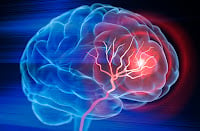Higher Neuropeptide Y Linked to Less Cognitive Impairment After Stroke

People who have high levels of the neurotransmitter neuropeptide Y may have a lower risk of cognitive impairment after ischemic stroke than those with low levels of neuropeptide Y, a study in the Journal of Affective Disorders has found. Ischemic stroke occurs when a blood clot blocks or narrows an artery leading to the brain. Neuropeptide Y is thought to regulate mood, appetite, circadian rhythms, and other functions.
Chongke Zhong, M.D., Ph.D., of the Medical College of Soochow University, Suzhou, China, and colleagues collected data from the blood samples of 593 adult patients who were admitted to a hospital for ischemic stroke between August 2009 to May 2013. Blood samples were drawn from the patients within 24 hours of being admitted to the hospital. The researchers then followed up with participants three months after hospitalization to assess the patients’ cognitive impairment using the Montreal Cognitive Assessment Score.
After three months of follow-up, 71.2% of the patients had experienced cognitive impairment. The researchers then divided the patients into three groups according to the levels of neuropeptide Y in the blood samples taken when the patients were admitted to the hospital. The researchers found that those in the group with the highest levels of neuropeptide Y were about 40% less likely to experience cognitive impairment after ischemic stroke compared with patients in the group who had the lowest amounts of neuropeptide Y.
“Plasma [neuropeptide Y] may have the potential to be a predictive factor and a therapeutic target for cognitive impairment after ischemic stroke,” Zhong and colleagues wrote. “It is of great clinical interest to test whether exogenous administration of [neuropeptide Y] in the acute phase of stroke would decrease the risk of [post-stroke cognitive impairment].”
For related information, see the Journal of Neuropsychiatry and Clinical Neurosciences article “Effective Tools to Predict Depression in Acute and Subacute Phase of Ischemic Stroke.”
(Image: iStock/peterschreiber.media)
Was Your Profile Used on CareDash Without Your Permission?
APA has heard from members regarding deceptive and misleading business practices by CareDash, a health care provider review and referral website. APA sent a letter to CareDash demanding that it remove from the platform all profiles of psychiatrists who have not provided consent to display their profile. APA members listed on CareDash without their consent are encouraged to consider taking action by filing individual complaints with (1) the Federal Trade Commission; (2) their state's consumer protection office (state contact information can be found in the dropdown menu); and/or (3) the Better Business Bureau by selecting “File a Complaint.”





